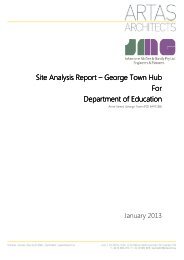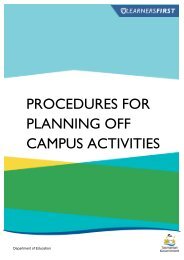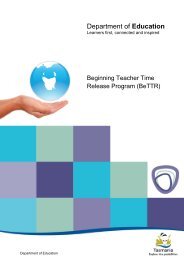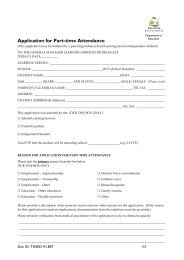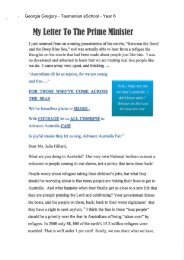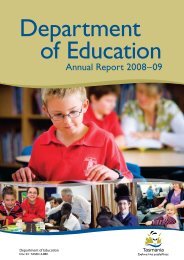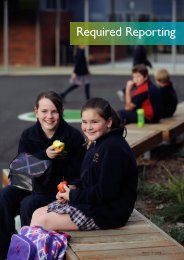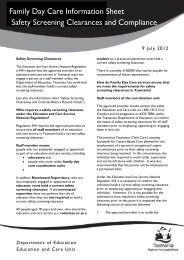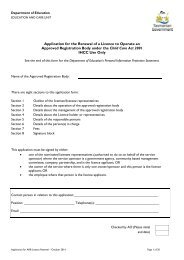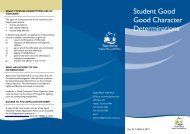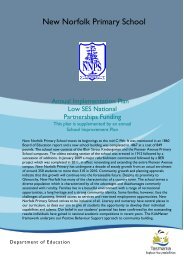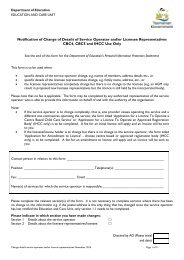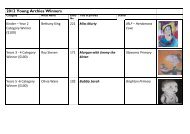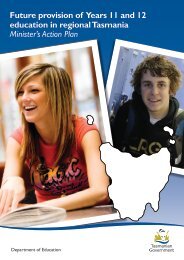Department of Education
DoE Annual Report 2010-2011 - Department of Education
DoE Annual Report 2010-2011 - Department of Education
- No tags were found...
Create successful ePaper yourself
Turn your PDF publications into a flip-book with our unique Google optimized e-Paper software.
GOAL 8: Open and accountable government that listens and plans for a shared future<br />
Standard 8.2: Support the participation <strong>of</strong> young people in decision-making<br />
8.2.2 Performance <strong>of</strong> students against national benchmarks for civics and<br />
citizenship<br />
Civics and<br />
citizenship<br />
curriculum<br />
provision<br />
Active<br />
civics and<br />
citizenship<br />
education<br />
Civics and citizenship education continued to be incorporated into the key strands <strong>of</strong> Democratic Values, and<br />
Processes and Responsible Citizenship within the Society and History curriculum area.<br />
Implementation <strong>of</strong> the Society and History curriculum continued in 2011. The National Statements <strong>of</strong> Learning<br />
for Civics and Citizenship are embedded in the Society and History K–10 syllabus and support materials.<br />
The Australian Curriculum will support students to relate well to others and foster an understanding <strong>of</strong> Australian<br />
society, citizenship and national values. Goal 2 <strong>of</strong> the Melbourne Declaration on <strong>Education</strong>al Goals for Young<br />
Australians refers to all young Australians becoming ‘active and informal citizens’.<br />
A number <strong>of</strong> civics and citizenship related programs are available to schools and colleges to increase student<br />
participation and knowledge <strong>of</strong> this curriculum area.<br />
Celebrating Democracy Week is held annually and participating primary and secondary schools design and<br />
implement events and activities to celebrate the week. Tasmanian students are represented at the Every<br />
Voice Counts! Student forum held in Canberra each year as part <strong>of</strong> Celebrating Democracy Week. The forum<br />
brings together students from all over Australia to debate topical civics and citizenship education issues, and to<br />
participate in an intensive three-day program.<br />
Contribution towards the benchmark<br />
The 2010 Civics and Citizenship assessment for Year 6 and Year 10 students across both government and nongovernment<br />
sectors, is part <strong>of</strong> the National Assessment Program (NAP) agreed to by all Ministers for <strong>Education</strong><br />
and Training. The NAP – Civics and Citizenship is one <strong>of</strong> a suite <strong>of</strong> national assessments (together with ICT and<br />
Science Literacy) conducted across a random sample <strong>of</strong> students on a three year cycle.<br />
The NAP – Civics and Citizenship assesses students’ knowledge and skills in civics and citizenship. Nationally, a<br />
sample <strong>of</strong> 7,246 Year 6 students across 335 primary schools and 6,409 Year 10 students across 312 secondary<br />
schools were assessed in October 2010. This included 945 Year 6 students across 47 primary schools and 774<br />
Year 10 students across 39 secondary schools from the Tasmanian government and non-government sectors.<br />
For Year 6 mean scores, Tasmania was ranked behind ACT and equal with NSW, Vic, WA and SA. It was placed<br />
ahead <strong>of</strong> QLD and NT. For Year 10 mean scores Tasmania was ranked behind NSW and ACT and equal with<br />
Vic, WA, SA, NT and QLD.<br />
To meet national curriculum obligations, schools focus on Society and History at least until, and including, Year 9.<br />
Appendices – Tasmania Together Activity Report – Goal 8<br />
147



